TVS Lanka: Analyzing Organizational Culture's Impact on Employees
VerifiedAdded on 2020/10/23
|25
|6442
|444
Report
AI Summary
This report examines the impact of organizational culture on employee performance, focusing on TVS Lanka. It begins with an executive summary outlining the importance of a healthy organizational culture for enhancing management and performance, leading to increased productivity, customer satisfaction, and company reputation. The report utilizes Handy's organizational cultural model to analyze TVS Lanka's performance, incorporating data findings from primary qualitative research, including surveys with managers, to understand the effects of organizational culture. It delves into the limitations of the research, such as potential biases in data collection. The analysis includes a critical commentary on the findings, discussing the responsibilities at both personal and organizational levels, and concludes with recommendations to improve TVS Lanka's working standards. The report covers Handy's four cultural types (Power, Task, Person, and Role) and their implications, supported by data findings and a discussion of the research design and data collection methods, including sampling techniques.
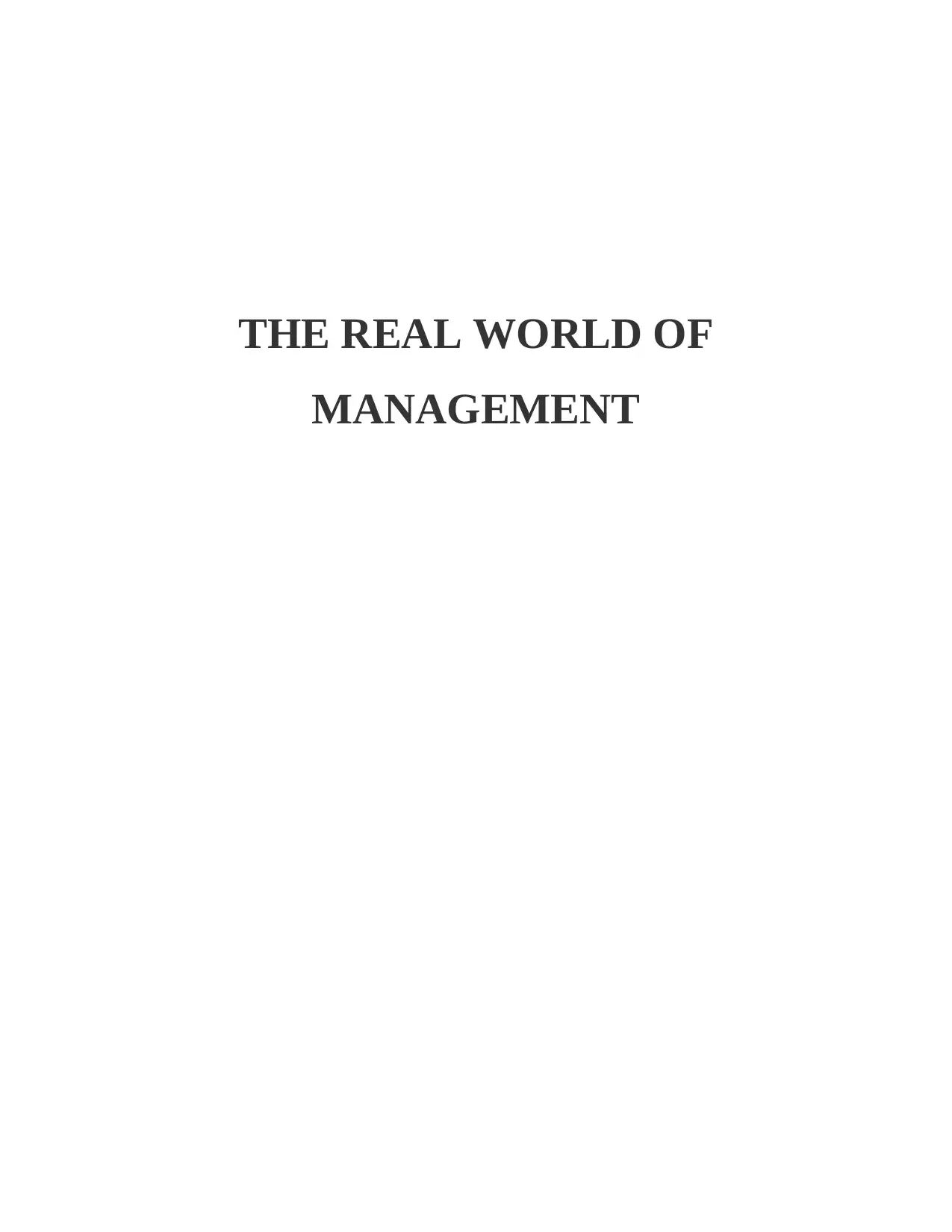
THE REAL WORLD OF
MANAGEMENT
MANAGEMENT
Paraphrase This Document
Need a fresh take? Get an instant paraphrase of this document with our AI Paraphraser
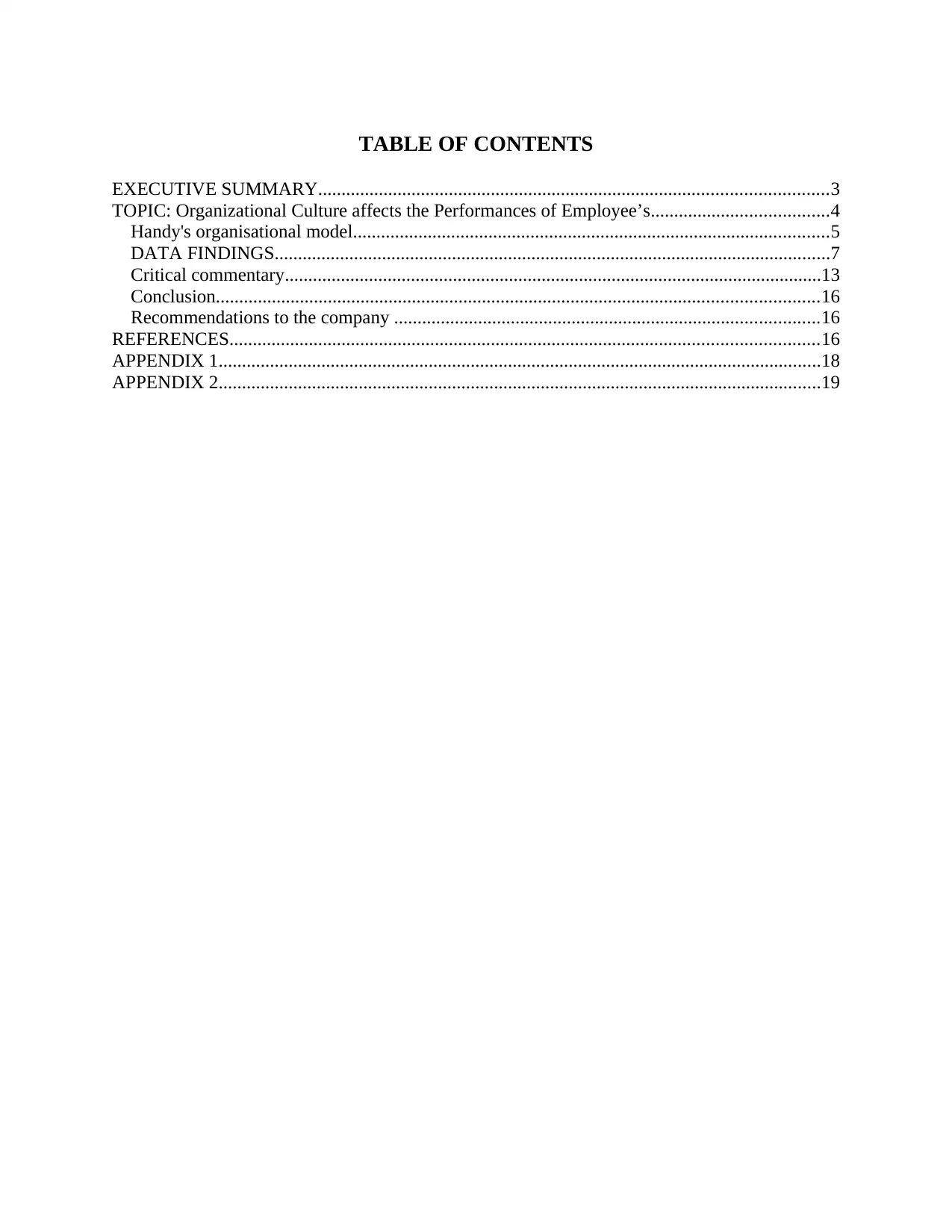
TABLE OF CONTENTS
EXECUTIVE SUMMARY.............................................................................................................3
TOPIC: Organizational Culture affects the Performances of Employee’s......................................4
Handy's organisational model......................................................................................................5
DATA FINDINGS.......................................................................................................................7
Critical commentary...................................................................................................................13
Conclusion.................................................................................................................................16
Recommendations to the company ...........................................................................................16
REFERENCES..............................................................................................................................16
APPENDIX 1.................................................................................................................................18
APPENDIX 2.................................................................................................................................19
EXECUTIVE SUMMARY.............................................................................................................3
TOPIC: Organizational Culture affects the Performances of Employee’s......................................4
Handy's organisational model......................................................................................................5
DATA FINDINGS.......................................................................................................................7
Critical commentary...................................................................................................................13
Conclusion.................................................................................................................................16
Recommendations to the company ...........................................................................................16
REFERENCES..............................................................................................................................16
APPENDIX 1.................................................................................................................................18
APPENDIX 2.................................................................................................................................19
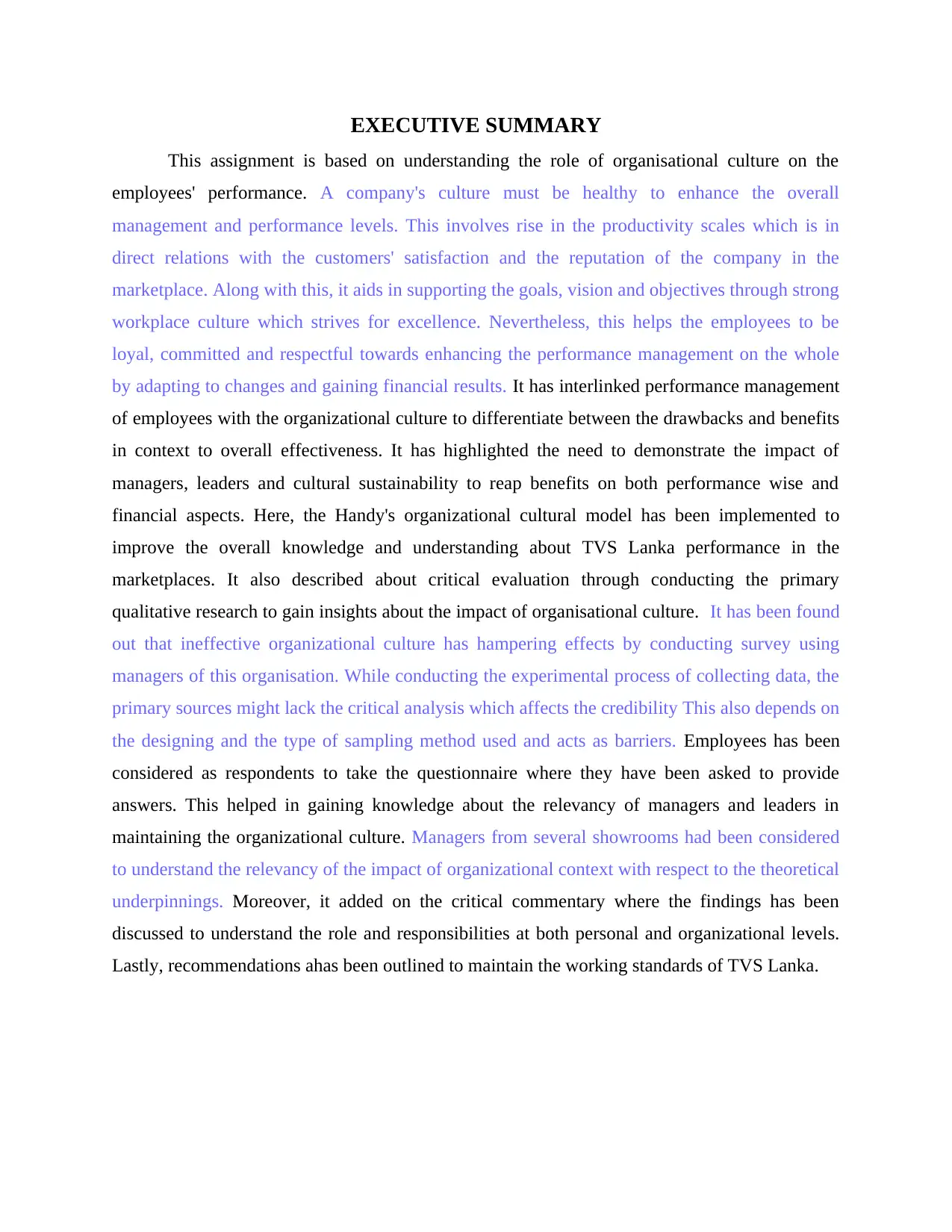
EXECUTIVE SUMMARY
This assignment is based on understanding the role of organisational culture on the
employees' performance. A company's culture must be healthy to enhance the overall
management and performance levels. This involves rise in the productivity scales which is in
direct relations with the customers' satisfaction and the reputation of the company in the
marketplace. Along with this, it aids in supporting the goals, vision and objectives through strong
workplace culture which strives for excellence. Nevertheless, this helps the employees to be
loyal, committed and respectful towards enhancing the performance management on the whole
by adapting to changes and gaining financial results. It has interlinked performance management
of employees with the organizational culture to differentiate between the drawbacks and benefits
in context to overall effectiveness. It has highlighted the need to demonstrate the impact of
managers, leaders and cultural sustainability to reap benefits on both performance wise and
financial aspects. Here, the Handy's organizational cultural model has been implemented to
improve the overall knowledge and understanding about TVS Lanka performance in the
marketplaces. It also described about critical evaluation through conducting the primary
qualitative research to gain insights about the impact of organisational culture. It has been found
out that ineffective organizational culture has hampering effects by conducting survey using
managers of this organisation. While conducting the experimental process of collecting data, the
primary sources might lack the critical analysis which affects the credibility This also depends on
the designing and the type of sampling method used and acts as barriers. Employees has been
considered as respondents to take the questionnaire where they have been asked to provide
answers. This helped in gaining knowledge about the relevancy of managers and leaders in
maintaining the organizational culture. Managers from several showrooms had been considered
to understand the relevancy of the impact of organizational context with respect to the theoretical
underpinnings. Moreover, it added on the critical commentary where the findings has been
discussed to understand the role and responsibilities at both personal and organizational levels.
Lastly, recommendations ahas been outlined to maintain the working standards of TVS Lanka.
This assignment is based on understanding the role of organisational culture on the
employees' performance. A company's culture must be healthy to enhance the overall
management and performance levels. This involves rise in the productivity scales which is in
direct relations with the customers' satisfaction and the reputation of the company in the
marketplace. Along with this, it aids in supporting the goals, vision and objectives through strong
workplace culture which strives for excellence. Nevertheless, this helps the employees to be
loyal, committed and respectful towards enhancing the performance management on the whole
by adapting to changes and gaining financial results. It has interlinked performance management
of employees with the organizational culture to differentiate between the drawbacks and benefits
in context to overall effectiveness. It has highlighted the need to demonstrate the impact of
managers, leaders and cultural sustainability to reap benefits on both performance wise and
financial aspects. Here, the Handy's organizational cultural model has been implemented to
improve the overall knowledge and understanding about TVS Lanka performance in the
marketplaces. It also described about critical evaluation through conducting the primary
qualitative research to gain insights about the impact of organisational culture. It has been found
out that ineffective organizational culture has hampering effects by conducting survey using
managers of this organisation. While conducting the experimental process of collecting data, the
primary sources might lack the critical analysis which affects the credibility This also depends on
the designing and the type of sampling method used and acts as barriers. Employees has been
considered as respondents to take the questionnaire where they have been asked to provide
answers. This helped in gaining knowledge about the relevancy of managers and leaders in
maintaining the organizational culture. Managers from several showrooms had been considered
to understand the relevancy of the impact of organizational context with respect to the theoretical
underpinnings. Moreover, it added on the critical commentary where the findings has been
discussed to understand the role and responsibilities at both personal and organizational levels.
Lastly, recommendations ahas been outlined to maintain the working standards of TVS Lanka.
⊘ This is a preview!⊘
Do you want full access?
Subscribe today to unlock all pages.

Trusted by 1+ million students worldwide
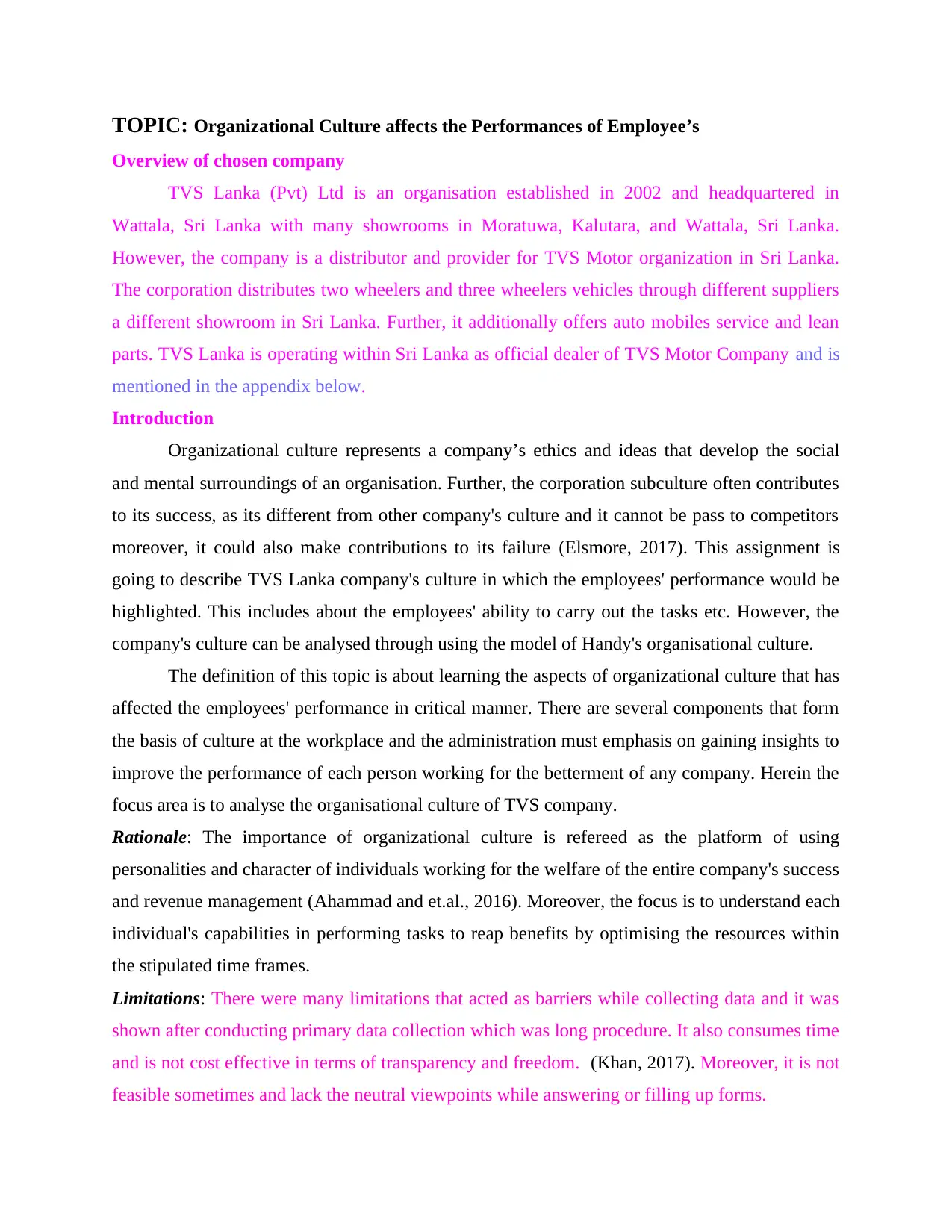
TOPIC: Organizational Culture affects the Performances of Employee’s
Overview of chosen company
TVS Lanka (Pvt) Ltd is an organisation established in 2002 and headquartered in
Wattala, Sri Lanka with many showrooms in Moratuwa, Kalutara, and Wattala, Sri Lanka.
However, the company is a distributor and provider for TVS Motor organization in Sri Lanka.
The corporation distributes two wheelers and three wheelers vehicles through different suppliers
a different showroom in Sri Lanka. Further, it additionally offers auto mobiles service and lean
parts. TVS Lanka is operating within Sri Lanka as official dealer of TVS Motor Company and is
mentioned in the appendix below.
Introduction
Organizational culture represents a company’s ethics and ideas that develop the social
and mental surroundings of an organisation. Further, the corporation subculture often contributes
to its success, as its different from other company's culture and it cannot be pass to competitors
moreover, it could also make contributions to its failure (Elsmore, 2017). This assignment is
going to describe TVS Lanka company's culture in which the employees' performance would be
highlighted. This includes about the employees' ability to carry out the tasks etc. However, the
company's culture can be analysed through using the model of Handy's organisational culture.
The definition of this topic is about learning the aspects of organizational culture that has
affected the employees' performance in critical manner. There are several components that form
the basis of culture at the workplace and the administration must emphasis on gaining insights to
improve the performance of each person working for the betterment of any company. Herein the
focus area is to analyse the organisational culture of TVS company.
Rationale: The importance of organizational culture is refereed as the platform of using
personalities and character of individuals working for the welfare of the entire company's success
and revenue management (Ahammad and et.al., 2016). Moreover, the focus is to understand each
individual's capabilities in performing tasks to reap benefits by optimising the resources within
the stipulated time frames.
Limitations: There were many limitations that acted as barriers while collecting data and it was
shown after conducting primary data collection which was long procedure. It also consumes time
and is not cost effective in terms of transparency and freedom. (Khan, 2017). Moreover, it is not
feasible sometimes and lack the neutral viewpoints while answering or filling up forms.
Overview of chosen company
TVS Lanka (Pvt) Ltd is an organisation established in 2002 and headquartered in
Wattala, Sri Lanka with many showrooms in Moratuwa, Kalutara, and Wattala, Sri Lanka.
However, the company is a distributor and provider for TVS Motor organization in Sri Lanka.
The corporation distributes two wheelers and three wheelers vehicles through different suppliers
a different showroom in Sri Lanka. Further, it additionally offers auto mobiles service and lean
parts. TVS Lanka is operating within Sri Lanka as official dealer of TVS Motor Company and is
mentioned in the appendix below.
Introduction
Organizational culture represents a company’s ethics and ideas that develop the social
and mental surroundings of an organisation. Further, the corporation subculture often contributes
to its success, as its different from other company's culture and it cannot be pass to competitors
moreover, it could also make contributions to its failure (Elsmore, 2017). This assignment is
going to describe TVS Lanka company's culture in which the employees' performance would be
highlighted. This includes about the employees' ability to carry out the tasks etc. However, the
company's culture can be analysed through using the model of Handy's organisational culture.
The definition of this topic is about learning the aspects of organizational culture that has
affected the employees' performance in critical manner. There are several components that form
the basis of culture at the workplace and the administration must emphasis on gaining insights to
improve the performance of each person working for the betterment of any company. Herein the
focus area is to analyse the organisational culture of TVS company.
Rationale: The importance of organizational culture is refereed as the platform of using
personalities and character of individuals working for the welfare of the entire company's success
and revenue management (Ahammad and et.al., 2016). Moreover, the focus is to understand each
individual's capabilities in performing tasks to reap benefits by optimising the resources within
the stipulated time frames.
Limitations: There were many limitations that acted as barriers while collecting data and it was
shown after conducting primary data collection which was long procedure. It also consumes time
and is not cost effective in terms of transparency and freedom. (Khan, 2017). Moreover, it is not
feasible sometimes and lack the neutral viewpoints while answering or filling up forms.
Paraphrase This Document
Need a fresh take? Get an instant paraphrase of this document with our AI Paraphraser
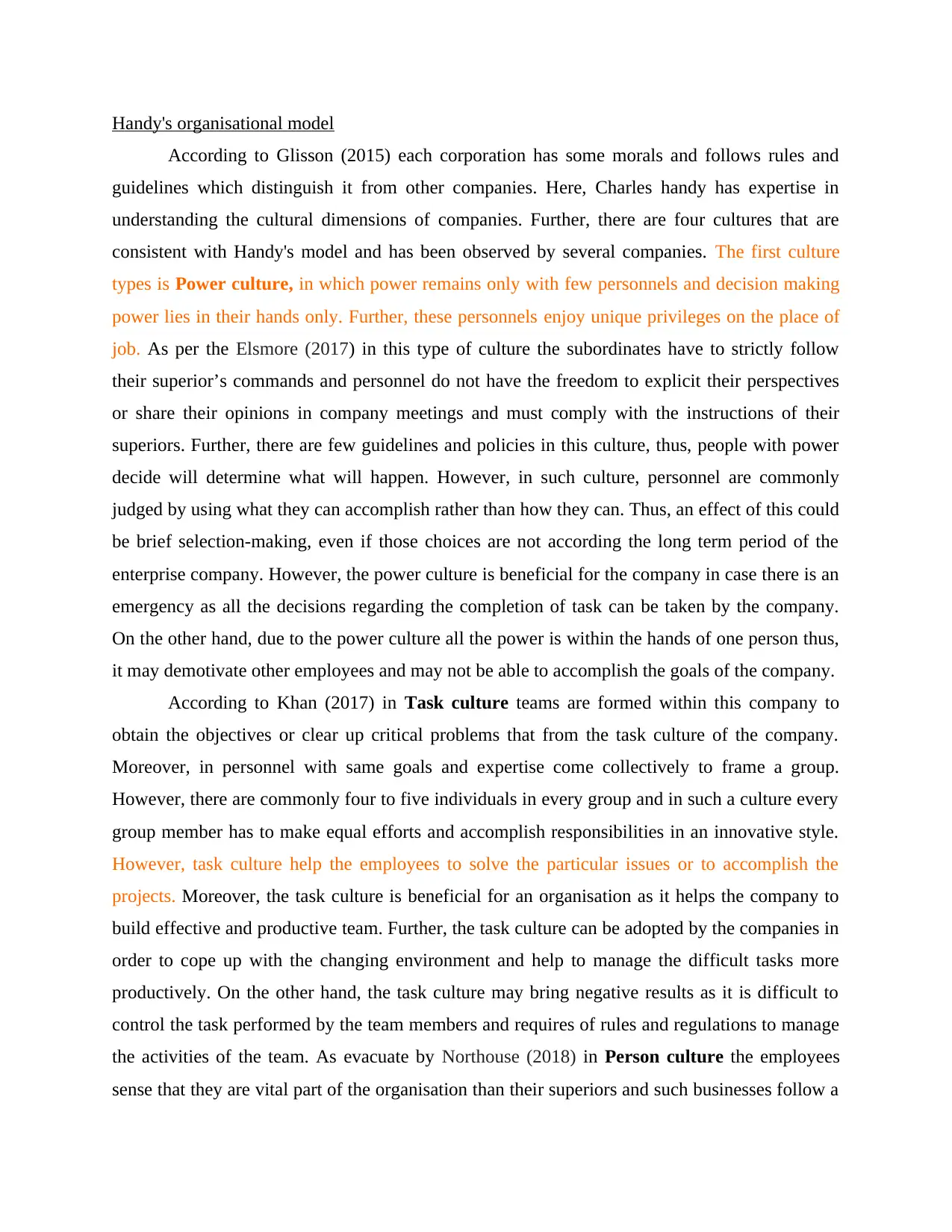
Handy's organisational model
According to Glisson (2015) each corporation has some morals and follows rules and
guidelines which distinguish it from other companies. Here, Charles handy has expertise in
understanding the cultural dimensions of companies. Further, there are four cultures that are
consistent with Handy's model and has been observed by several companies. The first culture
types is Power culture, in which power remains only with few personnels and decision making
power lies in their hands only. Further, these personnels enjoy unique privileges on the place of
job. As per the Elsmore (2017) in this type of culture the subordinates have to strictly follow
their superior’s commands and personnel do not have the freedom to explicit their perspectives
or share their opinions in company meetings and must comply with the instructions of their
superiors. Further, there are few guidelines and policies in this culture, thus, people with power
decide will determine what will happen. However, in such culture, personnel are commonly
judged by using what they can accomplish rather than how they can. Thus, an effect of this could
be brief selection-making, even if those choices are not according the long term period of the
enterprise company. However, the power culture is beneficial for the company in case there is an
emergency as all the decisions regarding the completion of task can be taken by the company.
On the other hand, due to the power culture all the power is within the hands of one person thus,
it may demotivate other employees and may not be able to accomplish the goals of the company.
According to Khan (2017) in Task culture teams are formed within this company to
obtain the objectives or clear up critical problems that from the task culture of the company.
Moreover, in personnel with same goals and expertise come collectively to frame a group.
However, there are commonly four to five individuals in every group and in such a culture every
group member has to make equal efforts and accomplish responsibilities in an innovative style.
However, task culture help the employees to solve the particular issues or to accomplish the
projects. Moreover, the task culture is beneficial for an organisation as it helps the company to
build effective and productive team. Further, the task culture can be adopted by the companies in
order to cope up with the changing environment and help to manage the difficult tasks more
productively. On the other hand, the task culture may bring negative results as it is difficult to
control the task performed by the team members and requires of rules and regulations to manage
the activities of the team. As evacuate by Northouse (2018) in Person culture the employees
sense that they are vital part of the organisation than their superiors and such businesses follow a
According to Glisson (2015) each corporation has some morals and follows rules and
guidelines which distinguish it from other companies. Here, Charles handy has expertise in
understanding the cultural dimensions of companies. Further, there are four cultures that are
consistent with Handy's model and has been observed by several companies. The first culture
types is Power culture, in which power remains only with few personnels and decision making
power lies in their hands only. Further, these personnels enjoy unique privileges on the place of
job. As per the Elsmore (2017) in this type of culture the subordinates have to strictly follow
their superior’s commands and personnel do not have the freedom to explicit their perspectives
or share their opinions in company meetings and must comply with the instructions of their
superiors. Further, there are few guidelines and policies in this culture, thus, people with power
decide will determine what will happen. However, in such culture, personnel are commonly
judged by using what they can accomplish rather than how they can. Thus, an effect of this could
be brief selection-making, even if those choices are not according the long term period of the
enterprise company. However, the power culture is beneficial for the company in case there is an
emergency as all the decisions regarding the completion of task can be taken by the company.
On the other hand, due to the power culture all the power is within the hands of one person thus,
it may demotivate other employees and may not be able to accomplish the goals of the company.
According to Khan (2017) in Task culture teams are formed within this company to
obtain the objectives or clear up critical problems that from the task culture of the company.
Moreover, in personnel with same goals and expertise come collectively to frame a group.
However, there are commonly four to five individuals in every group and in such a culture every
group member has to make equal efforts and accomplish responsibilities in an innovative style.
However, task culture help the employees to solve the particular issues or to accomplish the
projects. Moreover, the task culture is beneficial for an organisation as it helps the company to
build effective and productive team. Further, the task culture can be adopted by the companies in
order to cope up with the changing environment and help to manage the difficult tasks more
productively. On the other hand, the task culture may bring negative results as it is difficult to
control the task performed by the team members and requires of rules and regulations to manage
the activities of the team. As evacuate by Northouse (2018) in Person culture the employees
sense that they are vital part of the organisation than their superiors and such businesses follow a
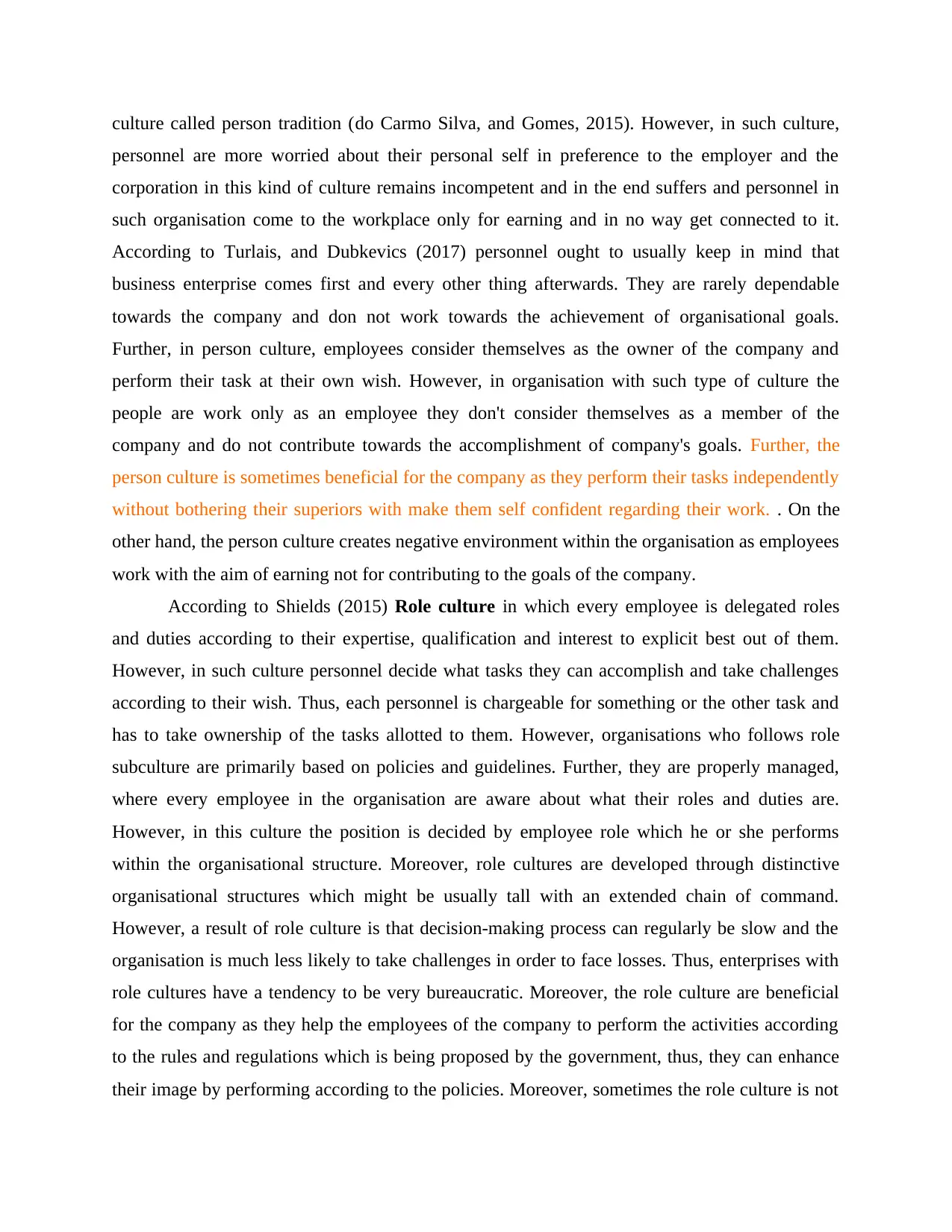
culture called person tradition (do Carmo Silva, and Gomes, 2015). However, in such culture,
personnel are more worried about their personal self in preference to the employer and the
corporation in this kind of culture remains incompetent and in the end suffers and personnel in
such organisation come to the workplace only for earning and in no way get connected to it.
According to Turlais, and Dubkevics (2017) personnel ought to usually keep in mind that
business enterprise comes first and every other thing afterwards. They are rarely dependable
towards the company and don not work towards the achievement of organisational goals.
Further, in person culture, employees consider themselves as the owner of the company and
perform their task at their own wish. However, in organisation with such type of culture the
people are work only as an employee they don't consider themselves as a member of the
company and do not contribute towards the accomplishment of company's goals. Further, the
person culture is sometimes beneficial for the company as they perform their tasks independently
without bothering their superiors with make them self confident regarding their work. . On the
other hand, the person culture creates negative environment within the organisation as employees
work with the aim of earning not for contributing to the goals of the company.
According to Shields (2015) Role culture in which every employee is delegated roles
and duties according to their expertise, qualification and interest to explicit best out of them.
However, in such culture personnel decide what tasks they can accomplish and take challenges
according to their wish. Thus, each personnel is chargeable for something or the other task and
has to take ownership of the tasks allotted to them. However, organisations who follows role
subculture are primarily based on policies and guidelines. Further, they are properly managed,
where every employee in the organisation are aware about what their roles and duties are.
However, in this culture the position is decided by employee role which he or she performs
within the organisational structure. Moreover, role cultures are developed through distinctive
organisational structures which might be usually tall with an extended chain of command.
However, a result of role culture is that decision-making process can regularly be slow and the
organisation is much less likely to take challenges in order to face losses. Thus, enterprises with
role cultures have a tendency to be very bureaucratic. Moreover, the role culture are beneficial
for the company as they help the employees of the company to perform the activities according
to the rules and regulations which is being proposed by the government, thus, they can enhance
their image by performing according to the policies. Moreover, sometimes the role culture is not
personnel are more worried about their personal self in preference to the employer and the
corporation in this kind of culture remains incompetent and in the end suffers and personnel in
such organisation come to the workplace only for earning and in no way get connected to it.
According to Turlais, and Dubkevics (2017) personnel ought to usually keep in mind that
business enterprise comes first and every other thing afterwards. They are rarely dependable
towards the company and don not work towards the achievement of organisational goals.
Further, in person culture, employees consider themselves as the owner of the company and
perform their task at their own wish. However, in organisation with such type of culture the
people are work only as an employee they don't consider themselves as a member of the
company and do not contribute towards the accomplishment of company's goals. Further, the
person culture is sometimes beneficial for the company as they perform their tasks independently
without bothering their superiors with make them self confident regarding their work. . On the
other hand, the person culture creates negative environment within the organisation as employees
work with the aim of earning not for contributing to the goals of the company.
According to Shields (2015) Role culture in which every employee is delegated roles
and duties according to their expertise, qualification and interest to explicit best out of them.
However, in such culture personnel decide what tasks they can accomplish and take challenges
according to their wish. Thus, each personnel is chargeable for something or the other task and
has to take ownership of the tasks allotted to them. However, organisations who follows role
subculture are primarily based on policies and guidelines. Further, they are properly managed,
where every employee in the organisation are aware about what their roles and duties are.
However, in this culture the position is decided by employee role which he or she performs
within the organisational structure. Moreover, role cultures are developed through distinctive
organisational structures which might be usually tall with an extended chain of command.
However, a result of role culture is that decision-making process can regularly be slow and the
organisation is much less likely to take challenges in order to face losses. Thus, enterprises with
role cultures have a tendency to be very bureaucratic. Moreover, the role culture are beneficial
for the company as they help the employees of the company to perform the activities according
to the rules and regulations which is being proposed by the government, thus, they can enhance
their image by performing according to the policies. Moreover, sometimes the role culture is not
⊘ This is a preview!⊘
Do you want full access?
Subscribe today to unlock all pages.

Trusted by 1+ million students worldwide
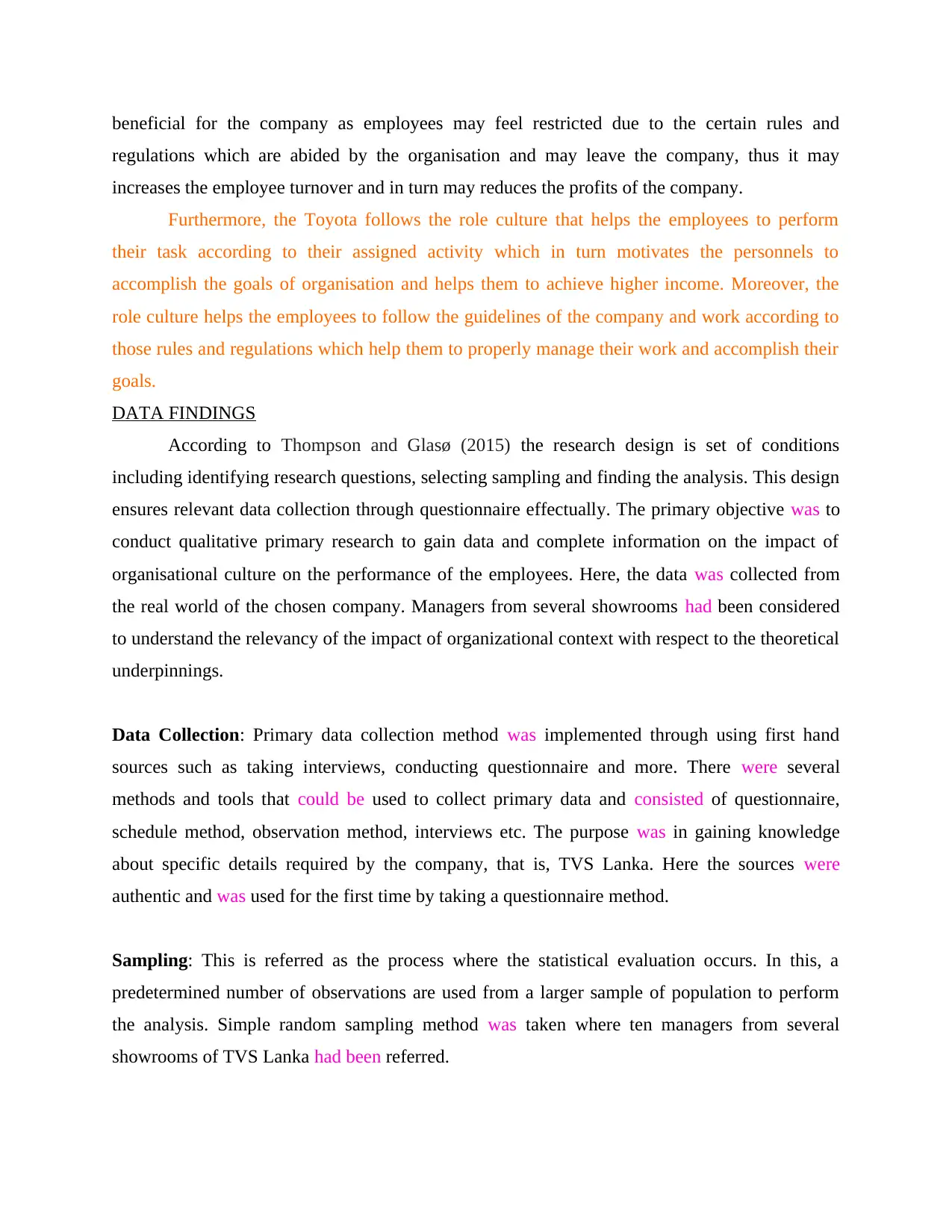
beneficial for the company as employees may feel restricted due to the certain rules and
regulations which are abided by the organisation and may leave the company, thus it may
increases the employee turnover and in turn may reduces the profits of the company.
Furthermore, the Toyota follows the role culture that helps the employees to perform
their task according to their assigned activity which in turn motivates the personnels to
accomplish the goals of organisation and helps them to achieve higher income. Moreover, the
role culture helps the employees to follow the guidelines of the company and work according to
those rules and regulations which help them to properly manage their work and accomplish their
goals.
DATA FINDINGS
According to Thompson and Glasø (2015) the research design is set of conditions
including identifying research questions, selecting sampling and finding the analysis. This design
ensures relevant data collection through questionnaire effectually. The primary objective was to
conduct qualitative primary research to gain data and complete information on the impact of
organisational culture on the performance of the employees. Here, the data was collected from
the real world of the chosen company. Managers from several showrooms had been considered
to understand the relevancy of the impact of organizational context with respect to the theoretical
underpinnings.
Data Collection: Primary data collection method was implemented through using first hand
sources such as taking interviews, conducting questionnaire and more. There were several
methods and tools that could be used to collect primary data and consisted of questionnaire,
schedule method, observation method, interviews etc. The purpose was in gaining knowledge
about specific details required by the company, that is, TVS Lanka. Here the sources were
authentic and was used for the first time by taking a questionnaire method.
Sampling: This is referred as the process where the statistical evaluation occurs. In this, a
predetermined number of observations are used from a larger sample of population to perform
the analysis. Simple random sampling method was taken where ten managers from several
showrooms of TVS Lanka had been referred.
regulations which are abided by the organisation and may leave the company, thus it may
increases the employee turnover and in turn may reduces the profits of the company.
Furthermore, the Toyota follows the role culture that helps the employees to perform
their task according to their assigned activity which in turn motivates the personnels to
accomplish the goals of organisation and helps them to achieve higher income. Moreover, the
role culture helps the employees to follow the guidelines of the company and work according to
those rules and regulations which help them to properly manage their work and accomplish their
goals.
DATA FINDINGS
According to Thompson and Glasø (2015) the research design is set of conditions
including identifying research questions, selecting sampling and finding the analysis. This design
ensures relevant data collection through questionnaire effectually. The primary objective was to
conduct qualitative primary research to gain data and complete information on the impact of
organisational culture on the performance of the employees. Here, the data was collected from
the real world of the chosen company. Managers from several showrooms had been considered
to understand the relevancy of the impact of organizational context with respect to the theoretical
underpinnings.
Data Collection: Primary data collection method was implemented through using first hand
sources such as taking interviews, conducting questionnaire and more. There were several
methods and tools that could be used to collect primary data and consisted of questionnaire,
schedule method, observation method, interviews etc. The purpose was in gaining knowledge
about specific details required by the company, that is, TVS Lanka. Here the sources were
authentic and was used for the first time by taking a questionnaire method.
Sampling: This is referred as the process where the statistical evaluation occurs. In this, a
predetermined number of observations are used from a larger sample of population to perform
the analysis. Simple random sampling method was taken where ten managers from several
showrooms of TVS Lanka had been referred.
Paraphrase This Document
Need a fresh take? Get an instant paraphrase of this document with our AI Paraphraser
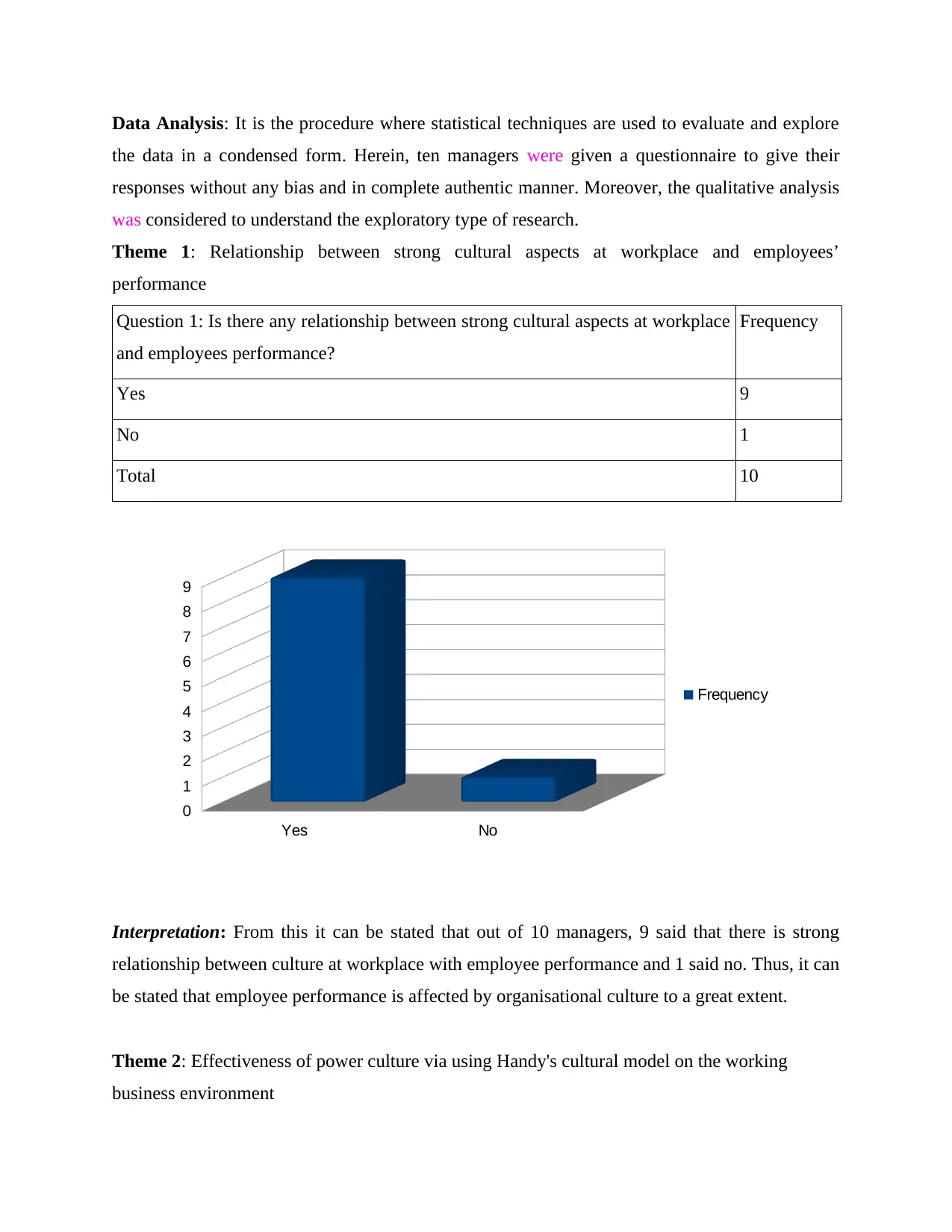
Data Analysis: It is the procedure where statistical techniques are used to evaluate and explore
the data in a condensed form. Herein, ten managers were given a questionnaire to give their
responses without any bias and in complete authentic manner. Moreover, the qualitative analysis
was considered to understand the exploratory type of research.
Theme 1: Relationship between strong cultural aspects at workplace and employees’
performance
Question 1: Is there any relationship between strong cultural aspects at workplace
and employees performance?
Frequency
Yes 9
No 1
Total 10
Interpretation: From this it can be stated that out of 10 managers, 9 said that there is strong
relationship between culture at workplace with employee performance and 1 said no. Thus, it can
be stated that employee performance is affected by organisational culture to a great extent.
Theme 2: Effectiveness of power culture via using Handy's cultural model on the working
business environment
Yes No
0
1
2
3
4
5
6
7
8
9
Frequency
the data in a condensed form. Herein, ten managers were given a questionnaire to give their
responses without any bias and in complete authentic manner. Moreover, the qualitative analysis
was considered to understand the exploratory type of research.
Theme 1: Relationship between strong cultural aspects at workplace and employees’
performance
Question 1: Is there any relationship between strong cultural aspects at workplace
and employees performance?
Frequency
Yes 9
No 1
Total 10
Interpretation: From this it can be stated that out of 10 managers, 9 said that there is strong
relationship between culture at workplace with employee performance and 1 said no. Thus, it can
be stated that employee performance is affected by organisational culture to a great extent.
Theme 2: Effectiveness of power culture via using Handy's cultural model on the working
business environment
Yes No
0
1
2
3
4
5
6
7
8
9
Frequency
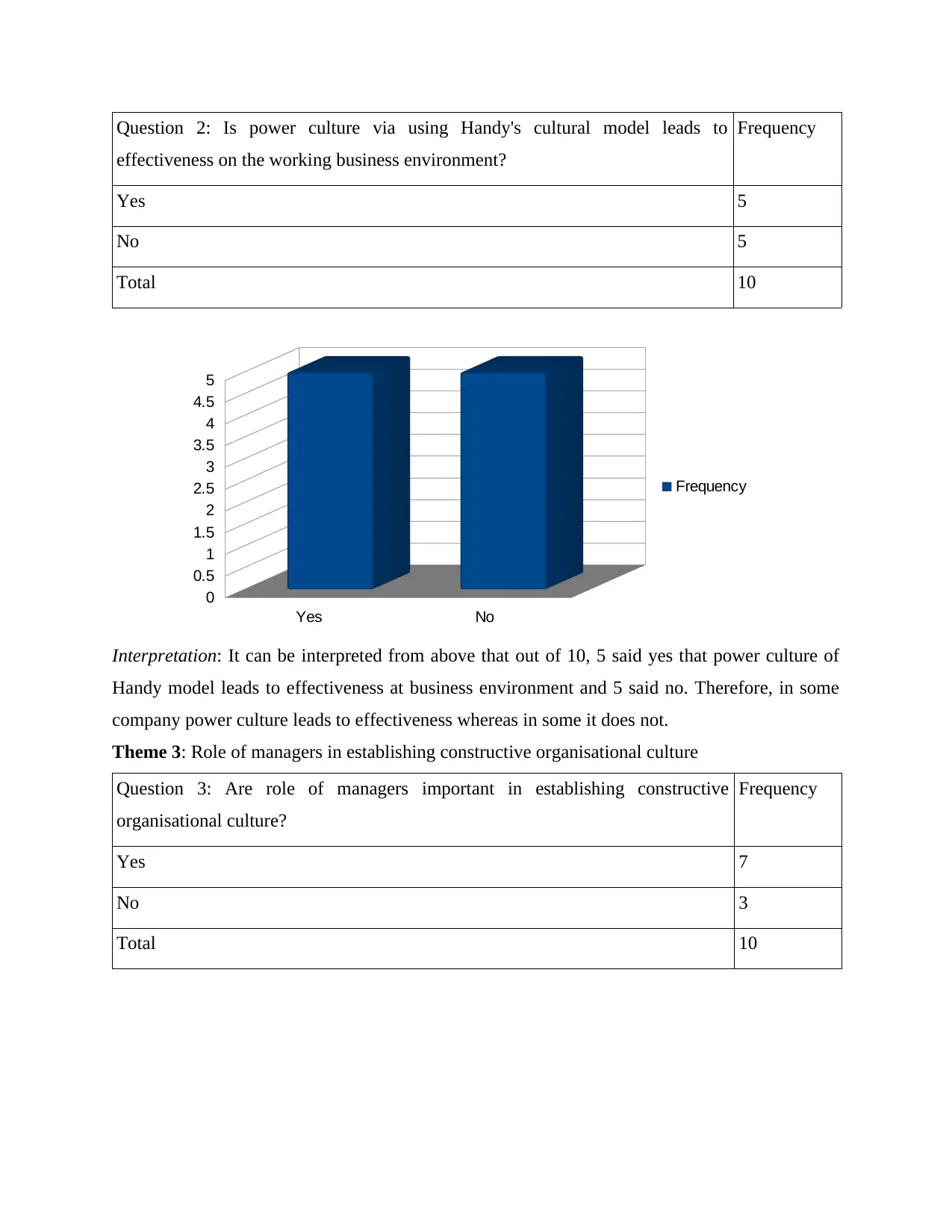
Question 2: Is power culture via using Handy's cultural model leads to
effectiveness on the working business environment?
Frequency
Yes 5
No 5
Total 10
Interpretation: It can be interpreted from above that out of 10, 5 said yes that power culture of
Handy model leads to effectiveness at business environment and 5 said no. Therefore, in some
company power culture leads to effectiveness whereas in some it does not.
Theme 3: Role of managers in establishing constructive organisational culture
Question 3: Are role of managers important in establishing constructive
organisational culture?
Frequency
Yes 7
No 3
Total 10
Yes No
0
0.5
1
1.5
2
2.5
3
3.5
4
4.5
5
Frequency
effectiveness on the working business environment?
Frequency
Yes 5
No 5
Total 10
Interpretation: It can be interpreted from above that out of 10, 5 said yes that power culture of
Handy model leads to effectiveness at business environment and 5 said no. Therefore, in some
company power culture leads to effectiveness whereas in some it does not.
Theme 3: Role of managers in establishing constructive organisational culture
Question 3: Are role of managers important in establishing constructive
organisational culture?
Frequency
Yes 7
No 3
Total 10
Yes No
0
0.5
1
1.5
2
2.5
3
3.5
4
4.5
5
Frequency
⊘ This is a preview!⊘
Do you want full access?
Subscribe today to unlock all pages.

Trusted by 1+ million students worldwide
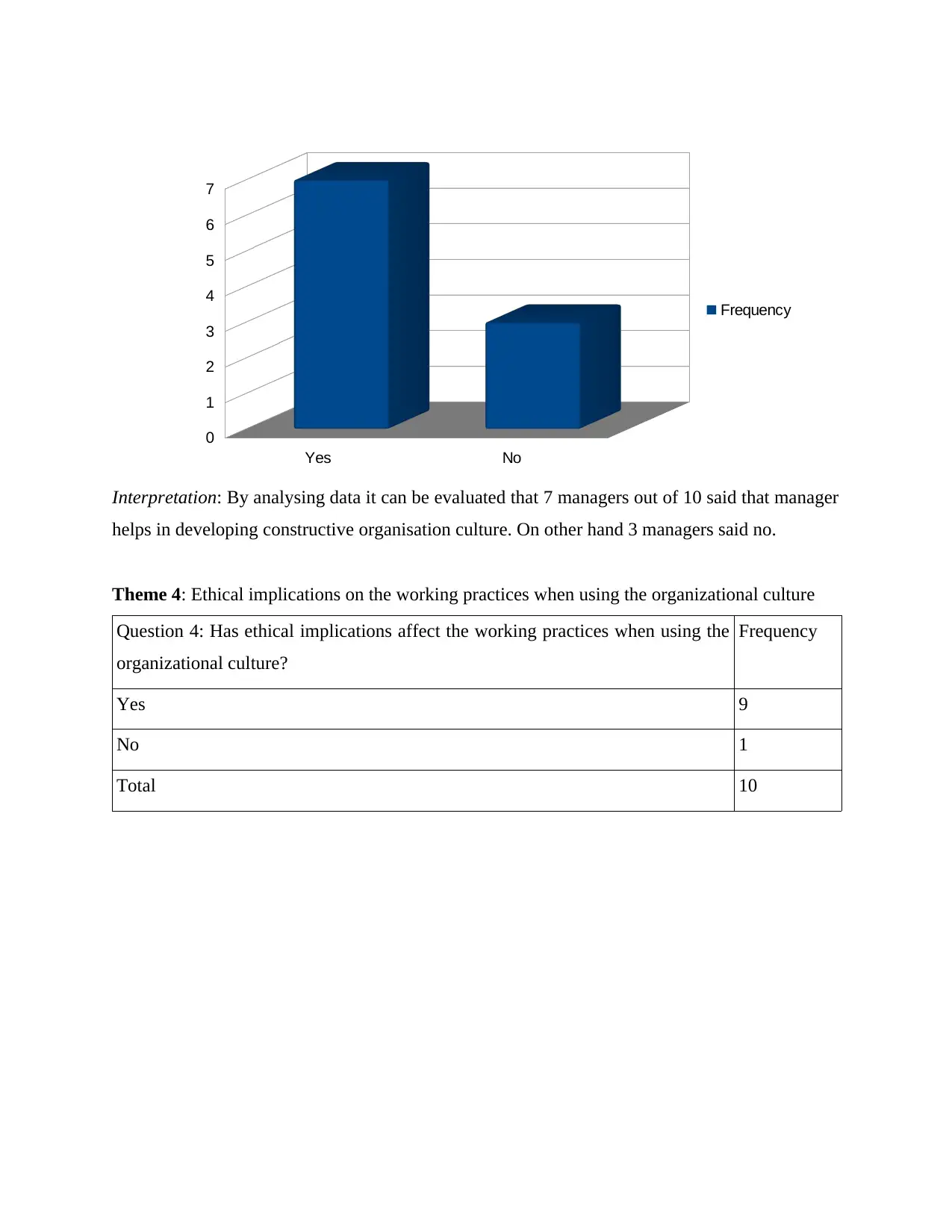
Interpretation: By analysing data it can be evaluated that 7 managers out of 10 said that manager
helps in developing constructive organisation culture. On other hand 3 managers said no.
Theme 4: Ethical implications on the working practices when using the organizational culture
Question 4: Has ethical implications affect the working practices when using the
organizational culture?
Frequency
Yes 9
No 1
Total 10
Yes No
0
1
2
3
4
5
6
7
Frequency
helps in developing constructive organisation culture. On other hand 3 managers said no.
Theme 4: Ethical implications on the working practices when using the organizational culture
Question 4: Has ethical implications affect the working practices when using the
organizational culture?
Frequency
Yes 9
No 1
Total 10
Yes No
0
1
2
3
4
5
6
7
Frequency
Paraphrase This Document
Need a fresh take? Get an instant paraphrase of this document with our AI Paraphraser
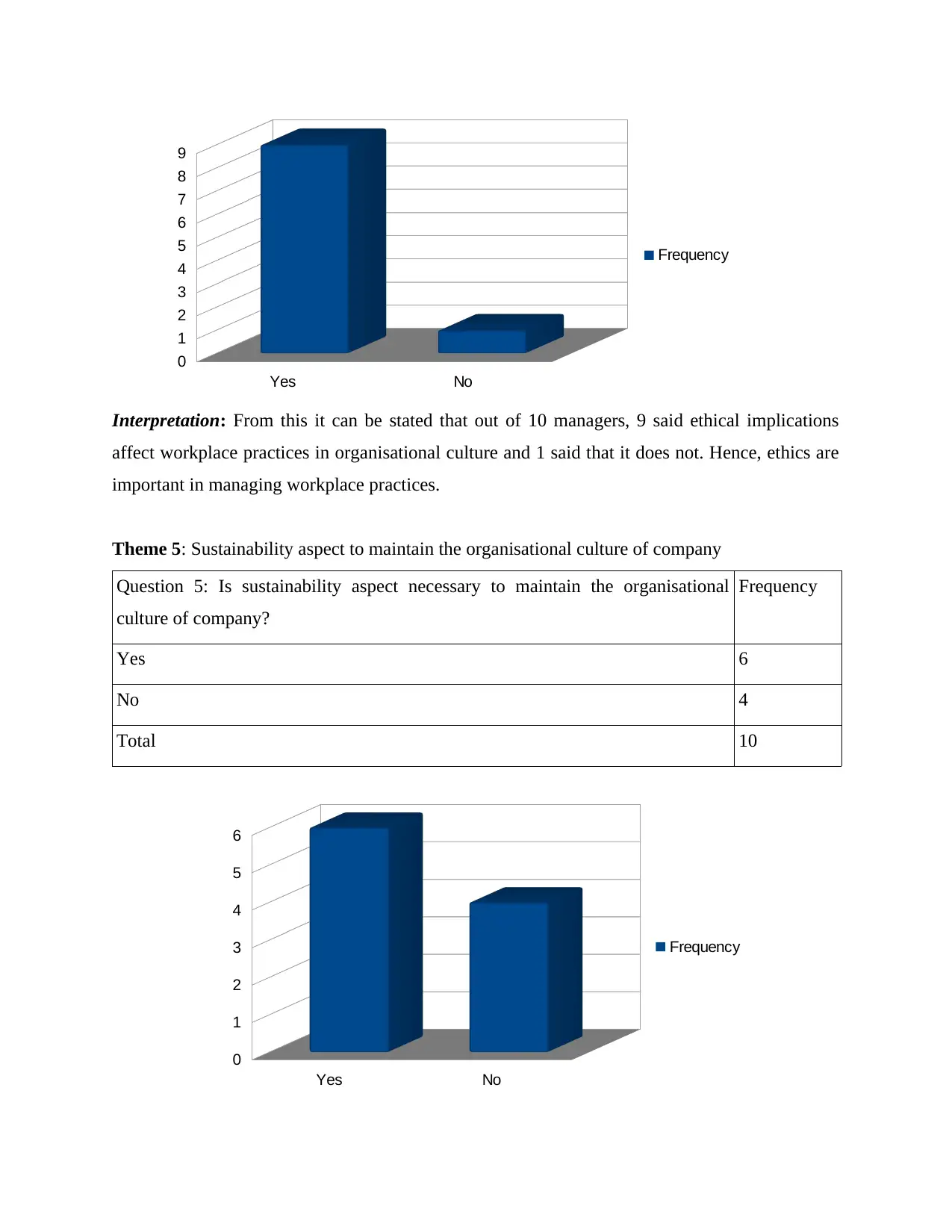
Interpretation: From this it can be stated that out of 10 managers, 9 said ethical implications
affect workplace practices in organisational culture and 1 said that it does not. Hence, ethics are
important in managing workplace practices.
Theme 5: Sustainability aspect to maintain the organisational culture of company
Question 5: Is sustainability aspect necessary to maintain the organisational
culture of company?
Frequency
Yes 6
No 4
Total 10
Yes No
0
1
2
3
4
5
6
7
8
9
Frequency
Yes No
0
1
2
3
4
5
6
Frequency
affect workplace practices in organisational culture and 1 said that it does not. Hence, ethics are
important in managing workplace practices.
Theme 5: Sustainability aspect to maintain the organisational culture of company
Question 5: Is sustainability aspect necessary to maintain the organisational
culture of company?
Frequency
Yes 6
No 4
Total 10
Yes No
0
1
2
3
4
5
6
7
8
9
Frequency
Yes No
0
1
2
3
4
5
6
Frequency
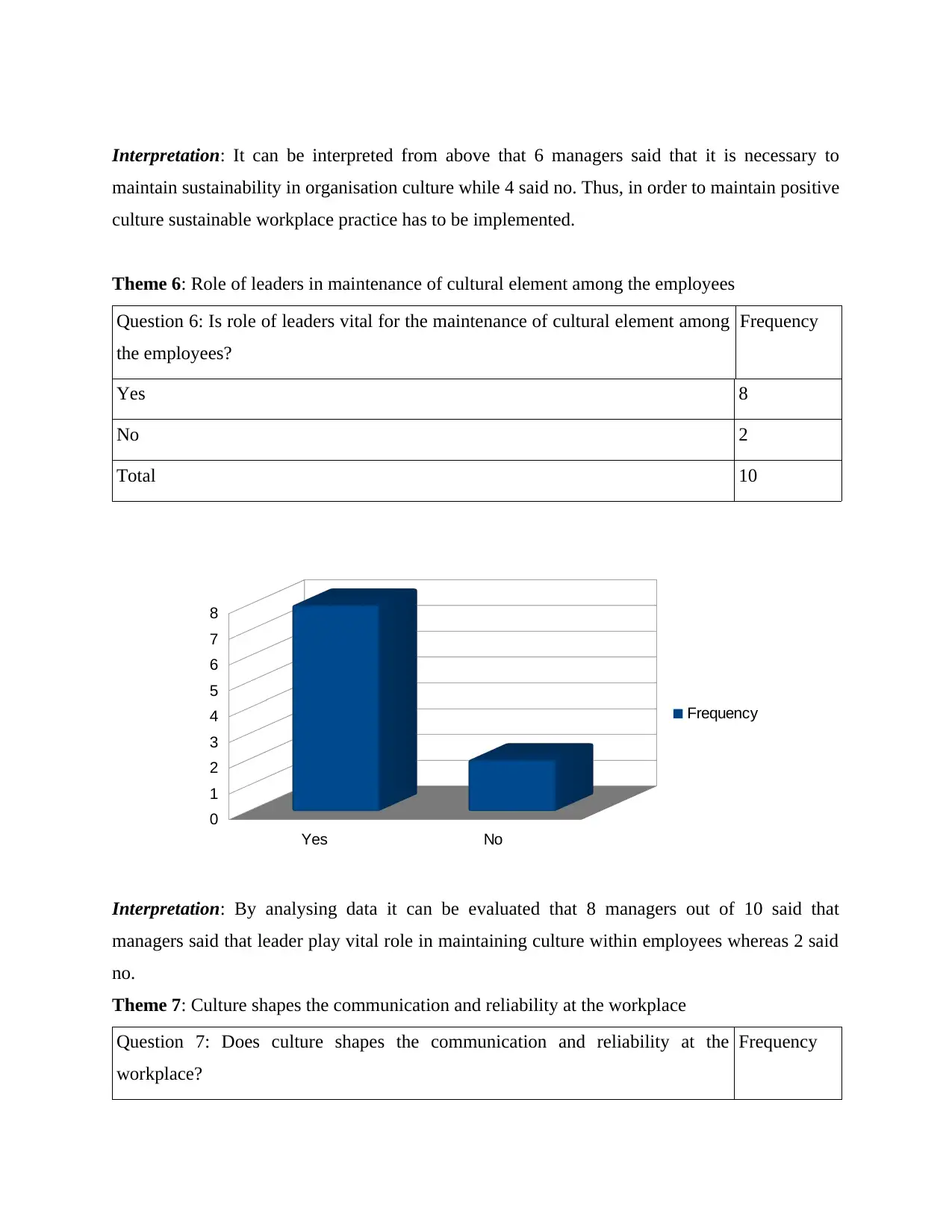
Interpretation: It can be interpreted from above that 6 managers said that it is necessary to
maintain sustainability in organisation culture while 4 said no. Thus, in order to maintain positive
culture sustainable workplace practice has to be implemented.
Theme 6: Role of leaders in maintenance of cultural element among the employees
Question 6: Is role of leaders vital for the maintenance of cultural element among
the employees?
Frequency
Yes 8
No 2
Total 10
Interpretation: By analysing data it can be evaluated that 8 managers out of 10 said that
managers said that leader play vital role in maintaining culture within employees whereas 2 said
no.
Theme 7: Culture shapes the communication and reliability at the workplace
Question 7: Does culture shapes the communication and reliability at the
workplace?
Frequency
Yes No
0
1
2
3
4
5
6
7
8
Frequency
maintain sustainability in organisation culture while 4 said no. Thus, in order to maintain positive
culture sustainable workplace practice has to be implemented.
Theme 6: Role of leaders in maintenance of cultural element among the employees
Question 6: Is role of leaders vital for the maintenance of cultural element among
the employees?
Frequency
Yes 8
No 2
Total 10
Interpretation: By analysing data it can be evaluated that 8 managers out of 10 said that
managers said that leader play vital role in maintaining culture within employees whereas 2 said
no.
Theme 7: Culture shapes the communication and reliability at the workplace
Question 7: Does culture shapes the communication and reliability at the
workplace?
Frequency
Yes No
0
1
2
3
4
5
6
7
8
Frequency
⊘ This is a preview!⊘
Do you want full access?
Subscribe today to unlock all pages.

Trusted by 1+ million students worldwide
1 out of 25
Related Documents
Your All-in-One AI-Powered Toolkit for Academic Success.
+13062052269
info@desklib.com
Available 24*7 on WhatsApp / Email
![[object Object]](/_next/static/media/star-bottom.7253800d.svg)
Unlock your academic potential
Copyright © 2020–2025 A2Z Services. All Rights Reserved. Developed and managed by ZUCOL.





